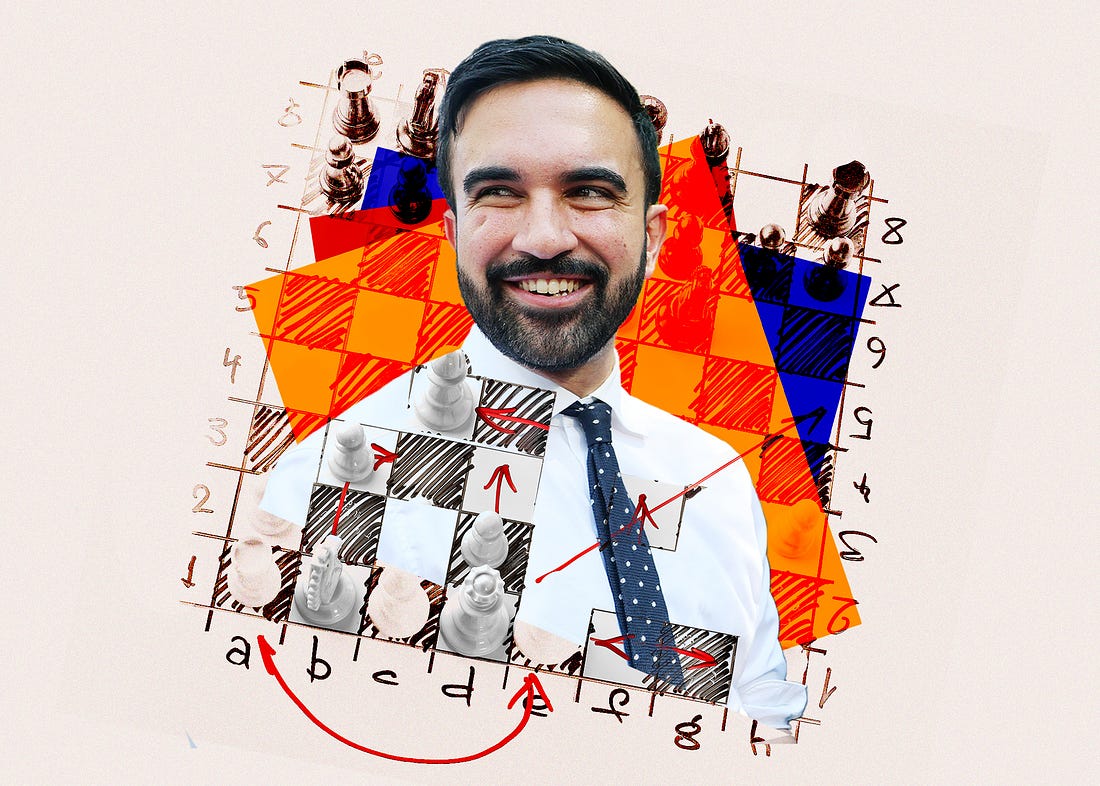|
 |
Hi, y’all. Welcome back to The Opposition. I wasn’t initially planning on writing today about the New York City mayoral race. But as results rolled in, it became clear that Zohran Mamdani’s win was a major moment for the Democrats. I also happened to be in New York City last week (for fun, not for work!) and was struck by the energy around Mamdani’s candidacy. Posters everywhere. People talking about him at bars. It’s the kind of organic excitement you can’t create in a conference room full of consultants. Moderate Democrats are, unsurprisingly, a little freaked out by it all. But even they believe that he ran an impressive campaign—one that they hope centrists can take lessons from.
If you value coverage like this, become a Bulwark subscriber. You’ll get access to all our products and, hopefully a clearer understanding of the internal debates rocking the Democratic party.
–Lauren
What Zohran Can Teach the Centrists
Moderate Democrats were left panicky over last night’s New York City mayoral primary. But some saw clear lessons for modern campaigning.
Big questions from the Big Apple
THE POLITICAL RIPPLE EFFECTS OF Zohran Mamdani’s shock win in the New York City Democratic mayoral primary Tuesday night will be felt in many directions over the course of many months. But for moderate-minded Democrats, they hit immediately, causing abject concern that their brand of politics does not translate to modern campaigns.
Moderate Democrats at organizations such as Third Way and Welcome PAC moved swiftly to downplay the significance of a 33-year-old self-described democratic socialist and Bowdoin College graduate suddenly becoming the favorite to run the biggest city in the country.
Other moderate Democrats, advisers, and groups argued that the party should not embrace Mamdani’s policy positions, while some privately suggested that elected Dems would be wise to publicly create distance from him. They stressed that democratic socialists have not flipped any seats in the Trump era, and that the path to winning back the Senate and the House will require elevating candidates with more centrist sensibilities, like Abigail Spanberger and Mikie Sherrill, the party’s gubernatorial nominees in Virginia and New Jersey, respectively.
And yet that quick rush of spin did little to calm a larger worry that the politics of moderation—inherently more cautious in policy and approach—doesn’t translate to primaries, where voters see bombast and nonconformity as a form of authenticity.
“I think the lesson here is people are looking for more outspoken Democrats, willing to take on the president but address some of these issues as well,” former Rep. Joe Crowley (D-N.Y.) told The Bulwark.
Fewer people have a better understanding of the circumstances that led to Mamdani’s win over former Gov. Andrew Cuomo last night than Crowley. Seven years ago, he was defeated in his primary campaign by Alexandria Ocasio-Cortez in a race that was similarly heralded as a changing of the political guard. “For Andrew, much like me when I was running, it is hard to motivate folks unless you have a cause,” Crowley reflected.
Among those centrist and establishment Democrats who were left concerned by Mamdani’s win, there was near-universal admission that he ran a tactically impressive campaign. His relentless focus on the cost of living and affordability resonated with voters. His energy and conviction came across online and in person. He took risks, put himself in front of voters, and made sure those moments were captured for social media.
As the Democratic party struggles to figure out its identity in the second Trump administration, even the centrists seem to agree that Mamdani’s victory is a sign that the old playbook for campaigning no longer works.
“It wasn’t what he was selling that the Democrats should emulate—it’s how he was doing it,” said Matt Bennett, a vice president at the center-left group Third Way. “We’ve got to be careful to nominate people that are bold. But bold is not a synonym for liberal. Bold means willing to engage.”
For this cohort, however, there are a number of reasons Democrats should be wary of drawing lessons from the mayoral primary—and not just because they believe the liberal politics of New York City Democratic circles won’t translate nationally. For starters, Cuomo was a deeply flawed candidate who adopted a hypercautious approach—racking up endorsements from union leaders and party officials, flooding the television airwaves with campaign ads, and sticking to traditional media interviews. (Full disclosure: The Bulwark, which interviewed Mamdani twice, reached out to Cuomo on four separate occasions for an interview and never received a reply.) Beyond that, the primary wins by Spanberger and Sherill indicated that more moderate candidates could prevail in these contests. (Spanberger ran unopposed in her primary.)
But others argued that the moderate members of the party would be unwise to discount Mamdani’s win, which could provide valuable lessons for their wing of the party.
“There’s a personality hurdle” for moderate candidates, said Adam Frisch, a former Colorado congressional candidate and director of electoral programs at Welcome PAC. “You have to let people know the times are really challenging and you are emotionally engaged. Centrists have the burden to show that because we don’t naturally grab the pitch forks.”
Ken Baer, a Democratic
